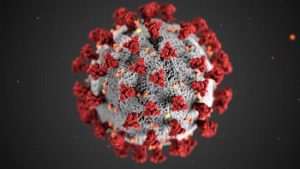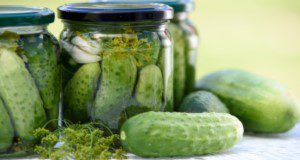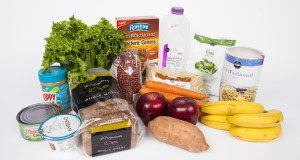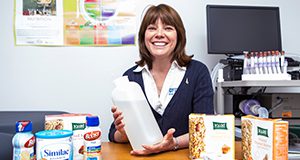¿Es el coronavirus un problema de seguridad en los alimentos?
¿Representa un riesgo de propagación del COVID-19 la comida que viene de otros países y estados afectados por este virus?
¿Es seguro comer en un establecimiento de comida que tenga un empleado infectado con el coronavirus?
¿Podría enfermarme con COVID-19 al tocar alimentos, paquetes de comidas o superficies que han estado en contacto con este virus?
¿Como deben manipularse los alimentos durante la pandemia de COVID-19?
This is the Spanish language translation of FSHN20-18-Span/FS341: COVID-19 and Food Safety FAQ: Is Coronavirus a Food Safety Issue?, written by Natalie Seymour, Mary Yavelak, Candice Christian, and Ben Chapman (NC State University Extension), and published by the UF/IFAS Food Science and Human Nutrition Department.
https://edis.ifas.ufl.edu/fs363
Tag: Food Science and Human Nutrition Department
COVID-19 preguntas frecuentes para servicios de comida: limpiando y desinfectando
¿Qué desinfectantes se deben usar?
¿Cómo se deben tratar las superficies?
¿Cómo se deben mantener las áreas de autoservicio?
¿Qué debe hacer si un cliente ha sido diagnosticado con COVID-19?
This is a Spanish language translation of FSHN20-13/FS336: COVID-19 FAQ for Food Service: Cleaning and Disinfection, written by Natalie Seymour, Mary Yavelak, Candice Christian, and Ben Chapman (NC State University Extension), and published by the UF/IFAS Food Science and Human Nutrition Department.
https://edis.ifas.ufl.edu/fs361
COVID-19: preguntas frequentes para huertas comunitarias: pasos para encargados de huertas y jardineros
This is the Spanish language version of FSHN20-19/FS342: COVID-19 FAQ for Community Gardens: Steps for Garden Managers and Gardeners, written by Natalie Seymour, Mary Yavelak, Candice Christian, and Ben Chapman (NC State University Extension), and published by the UF/IFAS Food Science and Human Nutrition Department.
https://edis.ifas.ufl.edu/fs360
COVID-19 preguntas frecuentes para servicios de comida: preguntas generales y salud de los empleados
¿Pudiera Propagarse el COVID-19 a través de los alimentos?
¿Puediera el virus alojarse en el cabello o en la barba?
¿Cuales son las practicas más efectivas que puedo implementar en mi establecimiento?
¿Existe algun procedimiento que deba seguir si un empleado es diagnosticado con COVID-19 o piensa que lo contrajo?
¿Puedo tomarle la temperatura a un empleado que venga a trabajar?
¿Qué sucede si un empleado tiene miedo y no quiere venir a trabajar o servirle a un cliente enfermo? ¿Qué tal si ya usó todos sus días de enfermedad (sick time)?
This is a Spanish language version of COVID-19 FAQ for Food Service: General Questions and Employee Health, written by Natalie Seymour, Mary Yavelak, Candice Christian, and Ben Chapman (NC State University Extension), and published by the UF/IFAS Food Science and Human Nutrition Department.
https://edis.ifas.ufl.edu/fs359
COVID-19 preguntas frecuentes para servicios de comida: recepcion de alimentos y sus empaques
¿Pudiera Propagarse el COVID-19 a través de los alimentos?
¿Es seguro recibir alimentos de estados o paises afectados por COVID-19?
¿Qué sucede si la cadena de suministro de alimentos se interrumpe?
¿Debo limpiar los empaques de alimentos antes de usarlos?
¿Qué debemos utilizar si queremos lavar y desinfectar?
This is a translation of FSHN20-14/FS337: COVID-19 FAQ for Food Service: Receiving and Food Packaging, written by Natalie Seymour, Mary Yavelak, Candice Christian, and Ben Chapman (NC State University Extension), and published by the UF/IFAS Food Science and Human Nutrition Department.
https://edis.ifas.ufl.edu/fs357
Preguntas frecuentes sobre el virus del COVID-19 en supermercados: limpieza y desinfección
¿Qué desinfectantes se deben utilizar?
¿Cómo deben manejarse las superficies y las áreas de auto servicio?
This is a Spanish language translation of FSHN20-09/FS332: COVID-19 FAQ for Grocery Stores: Cleaning and Disinfection, written by Natalie Seymour, Mary Yavelak, Candice Christian, and Ben Chapman (NC State University Extension), translated by Nelly Nelson, and published by the UF/IFAS Food Science and Human Nutrition Department.
https://edis.ifas.ufl.edu/fs356
COVID-19 para Supermercados: Recepción y empaque de alimentos
¿El virus COVID-19 puede transmitirse a través de los alimentos?
¿Es seguro aceptar alimentos de países o estados impactados por el virus COVID-19?
¿Deben limpiarse los paquetes de alimentos antes de usarlos?
Si queremos limpiar y desinfectar, ¿qué debe usarse?
This is the Spanish language version of FSHN20-08-Span/FS331, COVID-19 FAQ for Grocery Stores: Receiving and Food Packaging, written by Natalie Seymour, Mary Yavelak, Candice Christian, and Ben Chapman (NC State University Extension), translated by Liza Garcia-Jimenez, and published by the UF/IFAS Food Science and Human Nutrition Department.
https://edis.ifas.ufl.edu/fs355
Preguntas Frecuentes de COVID-19 para bancos de alimentos: recepción de alimentos y limpieza
¿Se puede propagar el COVID-19 a través de los alimentos?
¿Es seguro aceptar alimentos de países o estados impactados por COVID-19?
¿Deben limpiarse los empaques de alimentos antes de usarlos?
¿Cómo debe manejarse la limpieza y la desinfección?
This is the Spanish language version of FSHN20-7S/FS330, COVID-19 FAQ for Food Banks: Receiving Food and Cleaning, written by Natalie Seymour, Mary Yavelak, Candice Christian, and Ben Chapman (NC State University Extension), translated by Victor Blanco, and published by the UF/IFAS Food Science and Human Nutrition Department.
https://edis.ifas.ufl.edu/fs353
COVID-19 Preventative Measures: Cleaning and Disinfecting Reusable Bags
Current evidence suggests that novel coronavirus may remain viable for hours or days on a variety of surfaces. Cleaning followed by disinfection is recommended by the CDC as a best practice measure for prevention of COVID-19 and other viral respiratory illnesses in households and community settings. This new flyer, published by the UF/IFAS Food Science and Human Nutrition Department and written by Natalie Seymour, Mary Yavelak, Candice Christian, and Ben Chapman (NC State University Extension), provides information on safe cleaning and disinfection of reusable bags.
https://edis.ifas.ufl.edu/fs354
Is Coronavirus an Issue in Produce Production?
CDC, FDA and USDA have no reports at this time of human illnesses that suggest coronavirus can be transmitted by food or food packaging. Research on similar viruses, such as SARS and influenza, show risk of transmission from food is very low. While information on if or how long virus persists on surfaces is minimal, risk of foodborne transmission is low and should not be of concern. This flyer, written by Natalie Seymour, Mary Yavelak, Candice Christian, and Ben Chapman (NC State University Extension), provides answers to some frequently asked questions about coronavirus and produce production. Published by the UF/IFAS Food Science and Human Nutrition Department.
https://edis.ifas.ufl.edu/fs351
Is Coronavirus a Concern on Fresh Produce?
CDC, FDA and USDA are not aware of any reports at this time of human illnesses that suggest
coronavirus can be transmitted by food or food packaging. However, it is always important to
follow good hygiene practices (i.e., wash hands and surfaces often, separate raw meat from other
foods, cook to the right temperature, and refrigerate foods promptly) when handling or preparing foods. This flyer, written by Natalie Seymour, Mary Yavelak, Candice Christian, and Ben Chapman (NC State University Extension), provides answers to some frequently asked questions about coronavirus and fresh produce. Published by the UF/IFAS Food Science and Human Nutrition Department.
https://edis.ifas.ufl.edu/fs350
COVID-19 and Food Safety FAQ: Is Coronavirus a Concern with Takeout?
These flyers, written by Natalie Seymour, Mary Yavelak, Candice Christian, and Ben Chapman (NC State University Extension), provide quick, digestible information regarding prevention of COVID-19 and procedures for food service, grocery stores, and other food-related businesses. This flyer in particular provides guidance regarding takeout and COVID-19. Published by the UF/IFAS Food Science and Human Nutrition Department.
https://edis.ifas.ufl.edu/fs349
COVID-19 and Food Safety FAQ: Is Coronavirus a Concern at Grocery Stores?
These flyers, written by Natalie Seymour, Mary Yavelak, Candice Christian, and Ben Chapman (NC State University Extension), provide quick, digestible information regarding prevention of COVID-19 and procedures for food service, grocery stores, and other food-related businesses. This flyer in particular provides guidance regarding food safety at grocery stores. Published by the UF/IFAS Food Science and Human Nutrition Department.
https://edis.ifas.ufl.edu/fs348
COVID-19 FAQ for Community Gardens: Steps for Garden Managers and Gardeners
These flyers, written by Natalie Seymour, Mary Yavelak, Candice Christian, and Ben Chapman (NC State University Extension), provide quick, digestible information regarding prevention of COVID-19 and procedures for food service, grocery stores, and other food-related businesses. This flyer in particular provides guidance for managing community gardens with regards to COVID-19. Published by the UF/IFAS Food Science and Human Nutrition Department.
https://edis.ifas.ufl.edu/fs342
COVID-19 and Food Safety FAQ: Is Coronavirus a Food Safety Issue?
These flyers, written by Natalie Seymour, Mary Yavelak, Candice Christian, and Ben Chapman (NC State University Extension), provide quick, digestible information regarding prevention of COVID-19 and procedures for food service, grocery stores, and other food-related businesses. This flyer in particular provides information about food safety in relation to COVID-19. Published by the UF/IFAS Food Science and Human Nutrition Department.
https://edis.ifas.ufl.edu/fs341
COVID-19 Preventative Measures and FAQs for Food-Related Businesses
These two new series, written by Natalie Seymour, Mary Yavelak, Candice Christian, and Ben Chapman (NC State University Extension), provide quick, digestible information regarding prevention of COVID-19 and procedures for food service, grocery stores, and other food-related businesses. There are 15 flyers total, published by the UF/IFAS Food Science and Human Nutrition Department.
https://edis.ifas.ufl.edu/topic_series_covid-19_faqs
https://edis.ifas.ufl.edu/topic_series_covid-19_preventative_measures
How to Start a Food Business: Basic Food Technology; Food Acidity
Food acidity is an important parameter in food product development. Most people know that food acidity influences flavor, but more importantly, food acidity can affect the ability of microorganisms to grow in food. Food acidity, or the amount of acid that is present in the food, is used to classify a food product, and that classification determines the regulatory requirements for the specific food product. This new 6-page publication of the UF/IFAS Food Science and Human Nutrition Department describes how to measure food acidity and how food is classified based on its acidity. Written by Soohyoun Ahn, Jayna Goldstein, George Baker, and Matthew Krug.
https://edis.ifas.ufl.edu/fs325
Meal Planning for Adults with Diabetes
Nutrition, physical activity, and medication are the three main components of a diabetes management plan. According to the Americans Diabetes Association, there is no one diabetes meal plan; rather, it is a healthful eating pattern specifically designed to meet your individual needs. This new 2-page publication of the UF/IFAS Food Science and Human Nutrition Department provides some basic tips for creating a personalized meal plan for adults with diabetes. Written by Nancy J. Gal and Wendy J. Dahl.
https://edis.ifas.ufl.edu/fs323
Diabetes Meal Planning: Managing Your Carbohydrate Intake
If you have diabetes, maintaining a consistent carbohydrate intake throughout the day is an effective meal-planning method to help maintain your target blood glucose levels. Foods that contain carbohydrates have the greatest effect on blood glucose levels compared to foods that contain primarily protein or fat. Carbohydrates in foods that contribute to blood glucose includes sugars and starches. The amount of carbohydrate you consume is based on your diabetes treatment goals and carbohydrate tolerance. This new 3-page publication of the UF/IFAS Food Science and Human Nutrition Department, written by Nancy J. Gal and Wendy J. Dahl, provides a strategy for planning your daily menu to manage your carbohydrate intake.
https://edis.ifas.ufl.edu/fs324
Fibra alimentaria y enfermedades crónicas
La fibra alimentaria tiene muchos efectos positivos en la salud. Esta publicación describe las relaciones entre la fibra alimentaria y la prevención y el tratamiento de enfermedades crónicas.
This new 2-page publication of the UF/IFAS Food Science and Human Nutrition Department is a Spanish translation of FSHN18-11/FS314, Dietary Fiber and Chronic Disease. Written by Wendy Dahl and translated by Daniela Rivero Mendoza.
https://edis.ifas.ufl.edu/fs322




